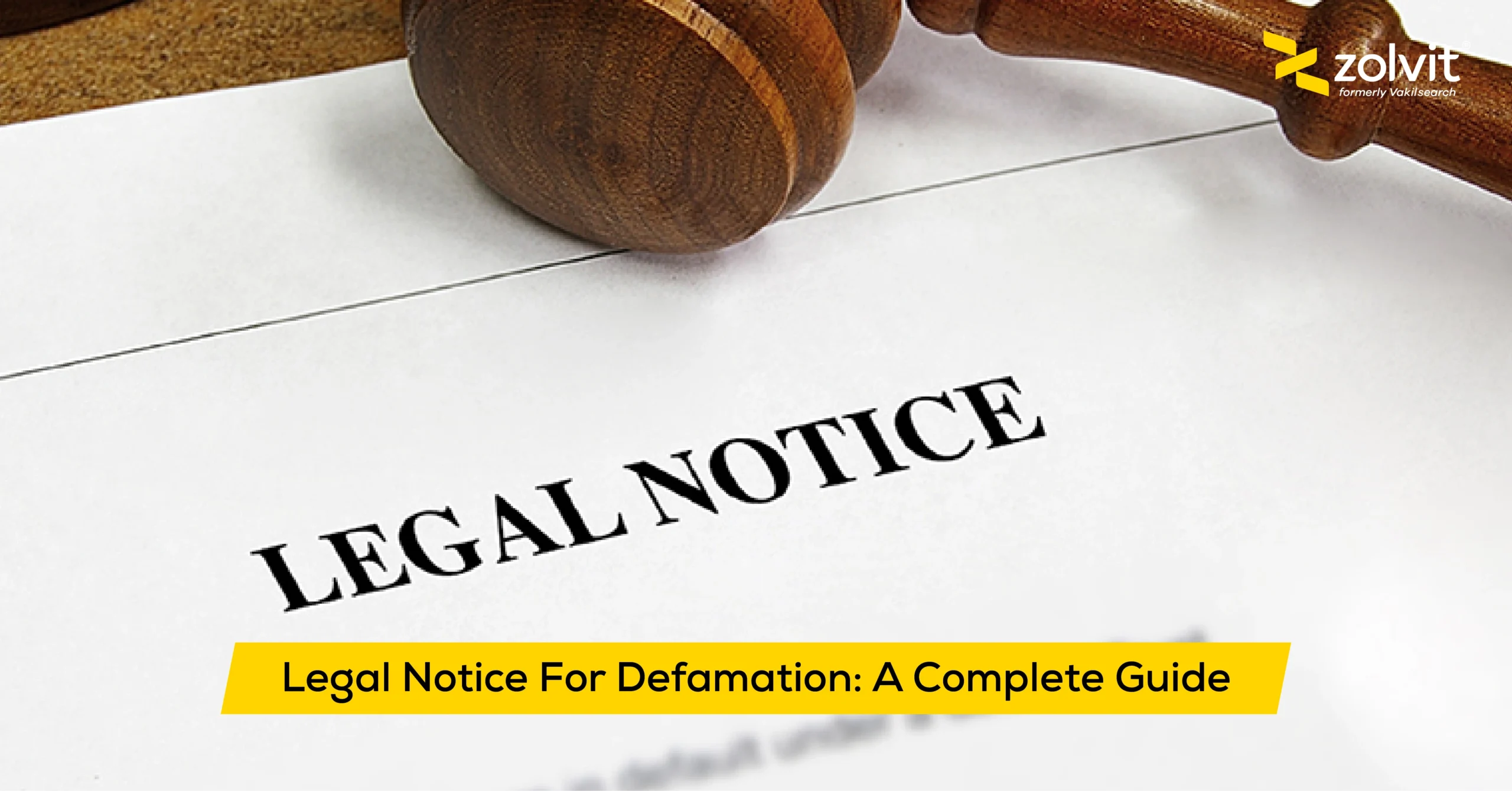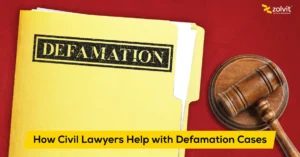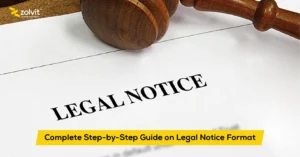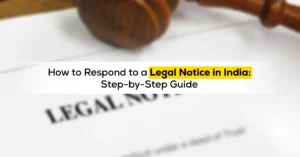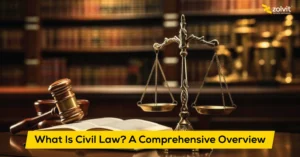Defamation, which includes libel (written defamation) and slander (spoken defamation), refers to damaging an individual’s reputation through false and misleading statements. A legal notice for defamation serves as an official notification, highlighting the defamatory remarks and requesting a public apology or retraction before pursuing further legal action.
In this blog, the key steps and laws related to sending a legal notice for defamation are outlined. It also explains the potential consequences and the role of defamation lawyers in such cases.
What is Defamation?
The act of making false statements about someone destroys the person’s reputation. It can be in the form of libel (written defamation) or slander (spoken defamation). For a statement to be considered defamatory, it must be untrue and injurious to the person’s reputation.
Legal Notice for Defamation: Why and When to Send One
A legal notice for defamation essentially serves as a formal communication with the person, who is alleged as having defamed that person, by specifying the defamatory statements and seeking a retraction or an apology before instituting legal proceedings. It is an important first step in a defamation case.
Purpose of Sending a Legal Notice
- Formal Record: It puts on record by making a formal document of the defamatory remarks and the intention of proceeding to court.
- Resolution Opportunity: It provides an opportunity for the accused to settle the matter without getting to court.
- Case Strengthening: Sending the notice indicates seriousness of intent thus strengthens the case in the event that litigation is taken.
- Guard Under Rights: It formally notifies the defamer which safeguards rights from excuses like ignorance.
When to Send a Legal Notice
- Upon Discovery: Notice should be given on discovery of the defamatory statement.
- Before Lawsuit: It is also not compulsory, but generally speaking, a pre-suit notice is very common for a defamation lawsuit.
- For Compensation: The notice may seek pecuniary damages for the reputational injury inflicted.
- For Retraction or Apology: It may also claim a retraction or an apology for the defamatory statements.
Sample Format for Legal Notice for Defamation
| LEGAL NOTICE
To, Subject: Legal Notice for Defamation I, [Advocate Name], representing my client, [Client’s Name], son of [Father’s Name], resident of [Address], New Delhi, hereby serve you with this legal notice for defamation, based on the following facts:
[Details of Compensation Demand] Through this legal notice, you are hereby requested to compensate my client within 14 days of receiving this notice. Failure to do so will result in my client pursuing legal action against you in court, at your expense and risk. A copy of this legal notice is retained in my office for further necessary actions. Counsel(s) Advocate Address: [Advocate’s Address] |
Documents Required for Legal Notice for Defamation
To send a legal notice for defamation, it’s crucial to gather the necessary documents that support your case. Below are the key documents required for drafting a defamation legal notice:
- Defamatory Statement Evidence: Written, spoken, or otherwise disseminated communications. This would typically include printed documents, screenshots, or audio/video recordings.
- Identity Proof of the Sender: Identification proof of the person or entity serving the notice.
- Evidence of Reputation Damage: Any evidence establishing how the defamatory statement affected the reputation of a human being.
- Copy of the Legal Notice: A copy is prepared, stating the contents of defamation, the harm caused, and the demand for other remedies or damages.
- Witness Statements: Testimonies from those able to ascertain the impact of the defamatory statement.
- Relevant Legal Provisions: Establishments relating to various regional defamation laws, along with Sections 499 of the Indian Penal Code that supports the claim.
- Identity Proof of the Defamees: A copy of the identity evidence of the defendant, if available.
- Medical Records, if any: Any medical documents evidencing the physical or psychological damage attributed to the act of defamation.
- Proof of Financial Loss (if any): Productions that exhibit financial losses sustained on account of the alleged defamatory statements.
- Settlement or compromise (if applicable): A copy of any settlement or agreement, which may be relevant to the matter.
- Previous legal paper (if applicable): Any documented facts of prior legal proceedings touching the subject-matter relevant to this complaint.
- Advocate’s letterhead: Any notice sent via an advocate should be on an advocate’s letterhead.
- Contact address: Complete contact information for both sender and recipient.
- Breakdown of damages: Full breakdown of all heads of damages claimed, including monetary compensation.
- Timeframe for the reply: An explicit time within which the recipient shall respond to the legal notice.
How to Send a Legal Notice for Defamation?
Filing a legal injunction for defamation usually requires the sending of a legal notice. This process includes several important steps to create documentation and, most importantly, communication with the alleged defamer. Here’s an overview of the procedure for sending a legal notice for defamation:
Step 1: Consult with a Lawyer:
Do consult an attorney on defamation to ensure that the notice has been drafted properly and conforms to any relevant laws. The attorney will help in the accurate depiction of factual and legal requirements in a notice.
Step 2: Gather Evidence:
Collect any proof supporting the defamation claim, such as emails, social media posts, or witness statements. Context has to be provided to illustrate the harm that the defamatory statement caused to your reputation.
Step 3: Draft the Legal Notice:
The notice must be drafted with clarity and formality, including the name and address of the parties, the statement in question, the resultant damage caused, and the specific relief sought, with a reasonable deadline for a response.
Step 4: Send the Legal Notice:
In sending the pages, it is good practice to have them sent via either registered post/courier with delivery confirmation and to keep copies of everything for your file, including delivery.
Step 5: Waiting Period and Further Action:
Give the recipient some time to respond or comply with the demand. If there is no response or compliance, you might consider other legal avenues such as filing a defamation case.
Possible Responses to a Legal Notice for Defamation
When responding to a legal notice for defamation, there are several steps you can take:
- For legal implications and advice on the proper course of action, consultation with a lawyer is recommended.
- Read the notification carefully to understand all the allegations and to procure necessary supporting documentation.
- Counter the allegations by denying them and providing your evidence.
- Once proven false, retract it and offer a public apology to limit any further harm.
- If warranted, negotiate settlement or resolution and consider a counterclaim if you have a basis for one.
Consequences of Defamation: Civil and Criminal Liability
Defamation can lead to both civil and criminal consequences, depending on the nature of the statement and the laws of the jurisdiction.
Civil Liability:
- Damages: Any person who made a defamatory statement may be asked to pay compensation for the damage caused to the aggrieved party’s reputation. This would include actual and punitive damages.
- Injunction: In some cases, a court can even restrain further publications from making such defamatory statements.
- Retraction: The court may also order a retraction or an apology, which the person making the defamatory statement would have to make publicly.
Criminal Liability:
- Penal Provisions: Defamation is a criminal offense in some jurisdictions. The author of a defamatory statement could be punished under the criminal law, for example, by being fined or imprisoned, especially if the false statement was made with malicious intent.
- Defamation as a Crime: Criminal defamation is frequently governed by a specific legal provision with variable penalties depending on the gravity and seriousness of the offense.
Laws Relating to Defamation in India
According to Indian law, defamation is concerned with false statements that injure the reputation of another person. It is a form of legal remedy. A legal notice in a case of defamation is issued to seek a retraction or apology before the formalities are pursued.
BNS Section 356 – Defamation
Section 356 of the Indian Penal Code (IPC) states about the defamation; it also specifies punishment, which may have been cast by a person in his criminal and civil terms for defamation.
Criminal Defamation Under Indian Law
In India, criminal defamation is dealt with by Sections 499 and 500 of the IPC, making it a punishable offense by imprisonment or fine.
Civil Defamation Laws
Civil defamation allows a party to approach the civil courts to claim damages for reputation. The damages for civil defamation are provided under the laws of libel or slander in India.
Role of Lawyers in Defamation Cases
In defamation cases, lawyers are vital in guiding clients through the legal process, assessing case strength, and collecting evidence. These are the roles they ensure clients’ rights are protected and appropriate remedies are sought in court.
- Advising on Legal Rights: Lawyers help clients understand their legal rights, including whether a statement qualifies as defamatory and whether it meets the legal criteria for defamation.
- Drafting Legal Notices: They draft and send formal legal notices on behalf of their clients, outlining the defamatory statements and demanding retraction or compensation.
- Evidence Collection: Lawyers assist in gathering relevant evidence, such as witness statements, social media posts, and documents, to support the defamation claim.
- Negotiation and Settlement: The attorney negotiates the settlement for the client, including but not limited to retraction, apology, or money to finalize the case outside the court.
- Representation in Court: In the event that the matter proceeds to trial, the lawyer will represent their client in court, presenting evidence and cross-examining witnesses while providing advocacy for an optimal outcome.
Conclusion
Dealing with a legal notice for defamation can be a challenging experience, but taking the right steps whether it’s pursuing a legal remedy, sending a well-drafted notice, or engaging in a potential settlement can help resolve the issue effectively. A lawyer’s role is vital in managing these cases, ensuring the protection of your rights, and obtaining the desired resolution. For professional assistance in handling defamation claims and related legal matters, consult Zolvit lawyers today.
FAQs Related to Legal Notice for Defamation
What happens if the defamation notice is ignored?
If ignored, the sender can file a lawsuit for damages.
Is it necessary to hire a lawyer for sending a defamation notice?
While not required, a lawyer ensures the notice is properly drafted.
How long does a defamation case take to resolve in India?
It can take several months to years, depending on case complexity.
Can I file an FIR for defamation?
Yes, an FIR can be filed under criminal defamation laws.
What is the punishment for defamation?
Punishment may include a fine, imprisonment for up to two years, or both.
Is a defamation case bailable?
Yes, criminal defamation is usually bailable.
